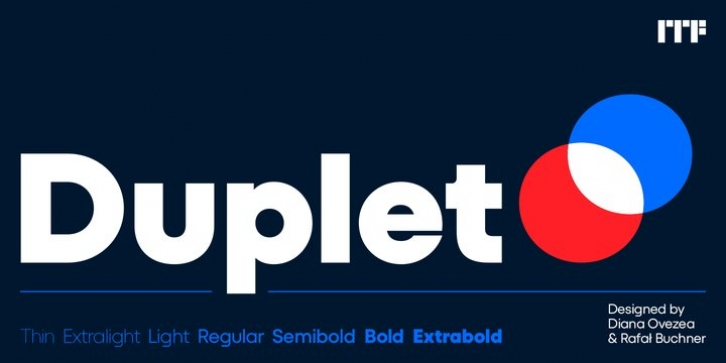Duplet was designed by Diana Ovezea, Rafał Buchner and published by Indian Type Foundry. Duplet contains 14 styles. The font is currently #15 in Hot New Fonts.
When you are looking for a typeface that can carry a tech message to readers, helps make communication easier and looks good, too – chances are high that you’ll select a geometric sans serif. These are the typefaces of today and tomorrow. From the headlines on news websites to the texts in apps and even company logos rendered large or small, geometric sans serifs are everywhere.
Duplet is part of a larger superfamily and can be combined with its relatives: Duplet Open and Duplet Rounded. Each contains seven weights ranging from Thin through ExtraBold, all with companion italics. The fonts include more than 450 glyphs, covering all the European languages written with the Latin script.
Since the Duplet fonts are geometric, the round characters and round-parts of letters appear either as circles or slanted circular forms (like you see in the italics). Duplet‘s letterforms are very low-contrast with strokes that seem even in thickness. Since the fonts support dozens of languages written with the Latin script, their character sets include many accented letters.
The default form of the ‘a’ in each font is single-storey. The large round bowl drives Duplet‘s inherent geometry home! But there is a double-storey ‘a’ as an OpenType alternate ‘a’. The default ‘g’ is also single-story, and its bottom stroke is flattened, giving it a streamlined, less-complicated look. Duplet fonts each feature three more ‘g’ versions as alternate characters.
There are also alternates for ‘k’, ‘u’, ‘G’, ‘K’, ‘M’ and the ampersand (&). The character sets include case-sensitive forms as well. Those are punctuation marks that are vertically repositioned and look better in all-caps texts. When it comes to numerals, both proportional and tabular lining figures are there – as well as fractions, superior numerals, and inferiors, too. Diana Ovezea and RafaÅ‚ Buchner designed this typeface.

